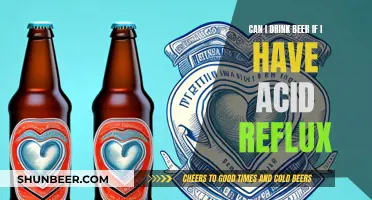
Drinking beer and other forms of alcohol has been linked to an increased risk of pancreatic cancer. Research indicates that alcohol use is one of the most common causes of chronic pancreatitis, which increases the risk of developing pancreatic cancer. Pancreatic cancer is a condition where abnormal cells grow within the pancreas and form tumors. It is difficult to detect and is often diagnosed at advanced stages.
While the underlying cause of pancreatic cancer is unknown, heavy alcohol consumption is a significant risk factor. Studies have shown that drinking three or more alcoholic beverages a day may increase the risk of developing pancreatic cancer. Alcohol consumption can also lead to pancreatitis, another risk factor for pancreatic cancer.
It is important to note that the relationship between alcohol intake and pancreatic cancer risk is complex and may vary depending on individual factors such as age, gender, smoking status, and other lifestyle choices. However, reducing alcohol consumption can be a preventative measure to lower the risk of developing pancreatic cancer.
| Characteristics | Values |
|---|---|
| Alcohol consumption and pancreatic cancer risk | Evidence is inconsistent, although heavy drinking may increase risk. |
| Alcohol consumption and pancreatitis | Drinking excessive amounts of alcohol is a common cause of chronic pancreatitis, which increases pancreatic cancer risk. |
| Alcohol consumption and diabetes | Alcohol consumption can lead to conditions such as chronic pancreatitis, which is known to increase the risk of diabetes. |
What You'll Learn

Alcohol consumption and pancreatitis
Alcohol consumption is a direct cause of both acute and chronic pancreatitis. Alcohol is one of the most common causes of acute pancreatitis, which is a necro-inflammatory disease resulting from exocrine cell destruction. It is the second most common cause of acute pancreatitis after gallstones, causing 17-25% of cases worldwide. Chronic alcohol consumption is the single most common cause of chronic pancreatitis, resulting in 40-70% of all cases.
The type of alcohol ingested does not affect the risk of developing pancreatitis. However, heavy alcohol consumption, defined as more than two drinks per day, can increase the risk of developing pancreatitis, with the risk increasing as the number of drinks increases. The mechanism by which alcohol causes pancreatitis involves the early activation of digestive enzymes, causing the pancreas to start digesting itself, which increases the risk of inflammation. This inflammation can lead to progressive loss of acinar, islet, and ductal cells.
Heavy alcohol consumption is associated with acute and repeated episodes of pancreatitis. Early interventions aimed at eliminating heavy alcohol consumption can reduce the progression of this disease. It is recommended that individuals experiencing an incident of acute alcohol-induced pancreatitis immediately stop alcohol consumption to avoid future incidents and lower the risk of developing chronic pancreatitis.
Cowboys' Favorite Beer: A Western Beverage Guide
You may want to see also

Alcohol consumption and diabetes
Alcohol consumption is a complex issue for people with diabetes, and it is important to be aware of how it can affect your body and how to manage this. Firstly, drinking alcohol can interfere with your blood sugar levels and increase the likelihood of having a hypo. This is because when you drink alcohol, your liver is busy breaking it down, so it does not release glucose into the bloodstream as effectively. This can lead to a drop in blood sugar levels, especially if you are drinking on an empty stomach. Therefore, it is important to always consume alcohol with a meal or a snack containing carbohydrates and never skip meals or substitute alcohol for food. It is also important to test your blood sugar levels more often as the effects of alcohol can make it harder to detect the symptoms of low blood sugar.
Alcohol can also affect your weight as alcoholic drinks can contain a lot of calories. Alcohol is often referred to as 'empty calories' as it is high in calories and low in nutrients. When your liver breaks down alcohol, it turns it into fat, which can lead to weight gain. Alcohol can also lead to elevated blood fats or triglycerides, which can increase your risk of heart disease.
In addition, alcohol can worsen diabetes-related medical complications such as nerve damage and eye disease. It can also cause other health issues such as raised blood pressure, neuropathy, and certain cancers. Therefore, it is important to stay within government guidelines and not to drink more than 14 units of alcohol per week. It is also important to note that alcohol can interact with certain diabetes medications such as chlorpropamide, metformin, and troglitazone.
Overall, while people with diabetes can still drink alcohol, it is important to be aware of the potential risks and to drink in moderation.
Beer and Pregnancy: Is It Safe for Expectant Mothers?
You may want to see also

Alcohol consumption and pancreatic cancer risk factors
Excessive alcohol consumption is a common cause of chronic pancreatitis, which increases the risk of developing pancreatic cancer. Pancreatic cancer is more common in people who frequently consume alcohol and smoke cigarettes. Research has found that heavy alcohol consumption may increase the risk of developing pancreatic cancer. However, the association between alcohol intake and pancreatic cancer risk remains unclear.
Risk factors you can change
Heavy alcohol consumption, defined as having three or more alcoholic drinks per day, may increase the risk of developing pancreatic cancer. Alcohol consumption can also contribute to pancreatitis, another risk factor for pancreatic cancer.
Risk factors you can't change
Some risk factors for pancreatic cancer, such as age and family history, cannot be changed. However, it is important to note that having one or more risk factors does not guarantee that an individual will develop pancreatic cancer.
Factors with an unclear effect on risk
Some studies suggest that heavy alcohol use may lead to conditions such as chronic pancreatitis, which is a known risk factor for pancreatic cancer. However, the exact link between alcohol consumption and pancreatic cancer risk remains to be fully elucidated.
Beer and Amoxicillin: Is It Safe to Drink?
You may want to see also

Alcohol consumption and pancreatic cancer prevention
Excessive alcohol consumption is a common cause of chronic pancreatitis, which increases the risk of pancreatic cancer. Research shows a link between alcohol use and pancreatic cancer, with heavy drinking potentially increasing the risk.
Risk Factors
- Smoking: The risk of pancreatic cancer is about twice as high for smokers compared to non-smokers. Cigar and smokeless tobacco products also increase the risk.
- Obesity: Obese people (BMI of 30 or more) are about 20% more likely to develop pancreatic cancer. Maintaining a moderate weight can help reduce the risk.
- Chronic Pancreatitis: Chronic pancreatitis is often caused by heavy alcohol consumption and smoking. It is a long-term inflammation of the pancreas and is linked to an increased risk of pancreatic cancer.
- Diet: A diet high in red and processed meats, fried foods, sugar, or cholesterol may increase the risk of pancreatic cancer. Limiting alcohol consumption and incorporating more whole foods can help reduce the risk.
- Workplace Exposure: Exposure to certain chemicals, such as those used in metalworking and dry cleaning, may increase the risk of pancreatic cancer.
Prevention Strategies
To reduce the risk of developing pancreatic cancer, it is recommended to:
- Quit smoking.
- Limit alcohol consumption.
- Maintain a healthy weight.
- Incorporate more whole foods into the diet.
Draught Beer: How Does It Work?
You may want to see also

Alcohol consumption and pancreatic cancer treatment
Excessive alcohol consumption is a common cause of chronic pancreatitis, which increases the risk of pancreatic cancer. Pancreatic cancer is often diagnosed at a late stage, leading to a low survival rate.
Alcohol consumption and pancreatic cancer risk
Research indicates a link between alcohol consumption and pancreatic cancer. While low-to-moderate alcohol intake has little to no effect on the risk of pancreatic cancer, heavy drinking is associated with an increased risk.
A 2015 case-control study found that alcohol consumption was not associated with pancreatic cancer risk. However, among current smokers, even light drinking was associated with a more than two-fold increased risk of pancreatic cancer.
Alcohol consumption and pancreatitis
Long-term alcohol use accounts for most cases of chronic pancreatitis, which often develops in people who smoke and consume excessive amounts of alcohol. Alcohol use leads to early activation of digestive enzymes, causing the pancreas to digest itself and increasing the risk of inflammation. Alcohol-related pancreatitis may also block the pancreatic duct, leading to the formation of stones.
Treatment options for pancreatic cancer
The treatment recommended for pancreatic cancer depends on the individual's age, cancer stage, and personal choice. Surgery, chemotherapy, or a combination of both may be used to remove cancer cells, relieve symptoms, and prevent complications.
Alcohol consumption during pancreatic cancer treatment
Individuals undergoing treatment for pancreatic cancer should avoid alcohol consumption as it can lower the survival rate and worsen treatment side effects, such as dehydration, mouth sores, and nausea.
Beer and Metformin: What You Need to Know
You may want to see also
Frequently asked questions
Research indicates that there may be a link between alcohol use and pancreatic cancer. Drinking excessive amounts of alcohol is a common cause of chronic pancreatitis, which increases the risk of pancreatic cancer.
Drinking three or more alcoholic drinks a day may increase your risk of developing pancreatic cancer. Drinking alcohol can also contribute to pancreatitis, another risk factor for pancreatic cancer.
Chronic pancreatitis often results from heavy drinking over a long period of time.
Other risk factors for pancreatic cancer include tobacco use, obesity, diabetes, workplace exposure to certain chemicals, age, sex, family history, and race.







